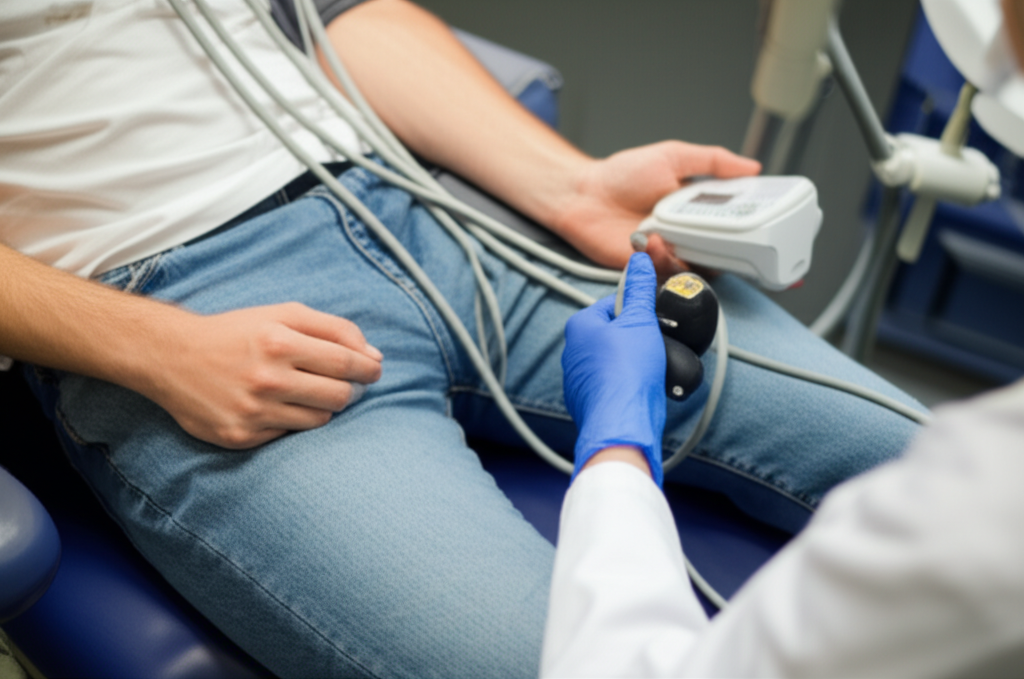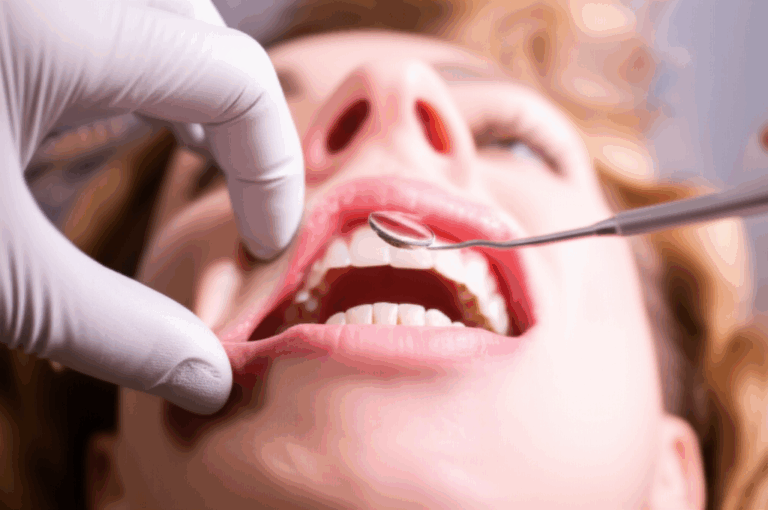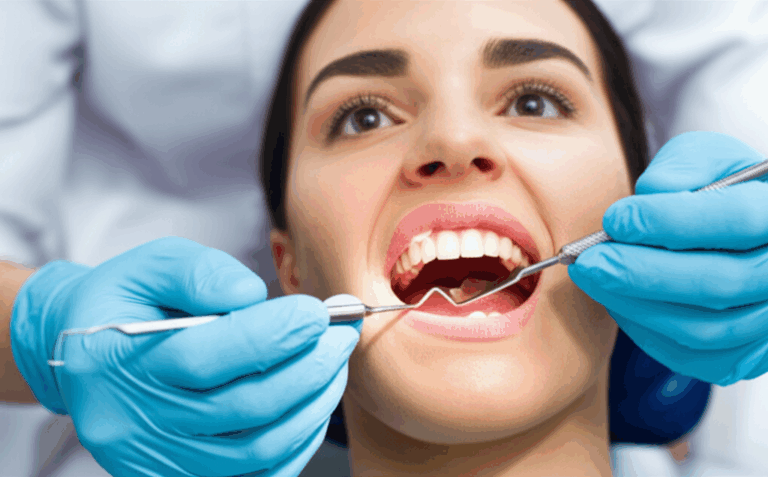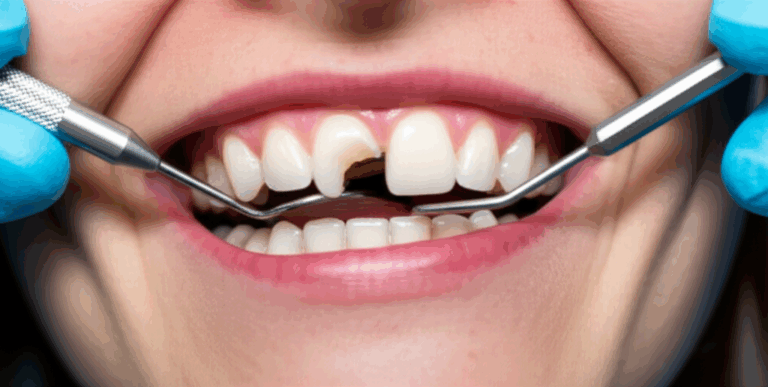
Why Dentists Check Your Blood Pressure: A Vital Step for Your Safety
Table of Contents
- Patient Safety & Risk Assessment
- Dental Procedures and Blood Pressure
- Dental Anxiety and Pain
- Catching Undiagnosed Hypertension
- Making Informed Treatment Decisions
- Understanding Normal, Elevated, and High Readings
- What Happens in a Hypertensive Crisis?
- Low Blood Pressure at the Dentist
- Medical History Forms and Communication
- Collaboration with Your Medical Team
- Monitoring and Emergency Preparedness
Introduction: My First Time Facing a Dental Blood Pressure Check
I still remember the first time a hygienist wrapped that blood pressure cuff around my arm right before a regular cleaning. It surprised me. “I thought I was here for my teeth, not my heart!” I joked, feeling a bit nervous. Like many people, I thought blood pressure was something checked at my yearly doctor visit—or only if I felt dizzy.
But that day taught me something new. My blood pressure was a little high, thanks to a stressful morning and some nerves about going to the dentist. My dentist explained why they take blood pressure, and what I learned made me see dental visits in a whole new way.
I want to share what I learned, the reasons this is a normal thing to do, and what it means for you. I’ll keep it simple and real, just like I wish someone would have done for me.
The Core Reasons Dentists Monitor Your Blood Pressure
Patient Safety & Risk Assessment
From what I’ve seen and been told by dental staff, keeping patients safe is the most important thing in the dental office. Checking blood pressure—whether you’re coming for a cleaning or something bigger like a tooth pulled—acts like an extra safety check. Dentists want to make sure there won’t be any health surprises before starting your dental care.
Think about finding out you have high blood pressure while sitting at the dentist. It happens more than you’d guess—studies show dentists often spot high numbers in people who didn’t know they were at risk. Catching this early can help stop bad things like strokes or heart attacks, which are rare in dental offices, but could happen if your blood pressure is way too high.
Dental Procedures and Blood Pressure
I was surprised at how many things about a dental visit can push your blood pressure up. Some are direct:
- Numbing shots—if they have something like epinephrine—can make your pressure rise, especially if you already have high blood pressure.
- Sedation for nervousness or pain can also affect your heart and blood pressure.
Once, a dentist chose a numbing shot without epinephrine because my blood pressure was almost too high. That small change helped me relax, and the whole visit went much better.
Dental Anxiety and Pain
If you get nervous at the dentist, you’re not alone. Being worried, or even just thinking you might feel pain, can make your blood pressure go up. Even a little stress is enough to push your numbers higher. This is why your dentist checks your pressure before doing anything. They know that sitting in the chair, the noise of tools, or just seeing someone in a white coat can make a big difference.
Catching Undiagnosed Hypertension
Dentists aren’t just there for your teeth—they sometimes find health problems no one else has spotted yet. It’s pretty common for a dentist to tell someone their blood pressure is high for the first time. A few patients near me were told to go see their doctor after a high reading was picked up at the dentist.
This kind of early find can help stop “the silent killer” (which is what doctors sometimes call high blood pressure) before it causes bigger problems.
Making Informed Treatment Decisions
Why not just treat everyone the same? Because your blood pressure reading tells your dentist:
- If it’s safe to go ahead with treatment today.
- If they should change the plan (like making the visit shorter, choosing another numbing shot, or taking more breaks).
- If they need to talk to your doctor before doing any work.
I like that my dentist talks over these choices with me. It’s not a test you’re trying to “pass”—it’s just a quick way to see how your health is doing right now.
What Do Your Blood Pressure Readings Mean at the Dentist?
Understanding Normal, Elevated, and High Readings
Let’s look at the numbers. When they squeeze your arm, you’ll see two numbers: one on top (systolic, when your heart beats) and one on the bottom (diastolic, when your heart relaxes).
Here’s what most dentists look for:
- Normal: Less than 120/80 mmHg
- Elevated: 120-129/<80 mmHg
- Stage 1 Hypertension: 130-139/80-89 mmHg
- Stage 2 Hypertension: 140+/90+ mmHg
- Hypertensive Crisis: Over 180/120 mmHg
Don’t worry if your reading is a little high. Many people have higher numbers at the dentist. But your dentist is careful because your safety comes first.
What Happens in a Hypertensive Crisis?
If your blood pressure comes back really high—more than 180/120 mmHg—that’s called a hypertensive crisis. This is very serious. I once saw this happen. The dentist stayed calm, sat the patient back, and took the blood pressure again a little later. Then she told the patient to see a doctor as soon as possible and didn’t do any dental work that day.
No good dentist will risk someone having a stroke or heart attack in the office.
Low Blood Pressure at the Dentist
Some people have blood pressure that’s too low. This can make you feel dizzy or lightheaded—which is also why dentists check your numbers.
If you ever felt dizzy after sitting up at the end of your cleaning, you know what I mean. Dentists might tilt your chair slowly, let you rest for a minute, or offer you water. Sometimes, having low blood pressure means they’ll go slower and be extra careful.
What Happens if Your Blood Pressure is High at the Dentist?
Immediate Steps and Reassessment
If my blood pressure reading is higher than expected, the dentist never ignores it. They’ll usually:
- Ask what my normal blood pressure is, or if there have been any changes lately.
- Wait five or ten minutes, then try reading it again—after I’ve had a chance to breathe and relax.
- Talk over any changes to my medicine, if I had coffee, or if I feel stressed.
Honestly, stopping to take a few deep breaths or thinking about something good can really help lower my pressure the second time.
Treatment Adjustments for Safety
If my numbers are still high, the dentist might:
- Wait to do regular dental work until my pressure comes down.
- Use numbing shots without epinephrine.
- Make sessions shorter, with breaks to check on how I’m feeling.
- Look for ways to help me relax (like letting me listen to music, give me laughing gas, or just talk to me more).
A good dental team changes things up so you feel safe—not rushed or embarrassed.
When Referral is Needed
If my blood pressure stays in the really high range, my dentist says I should see my regular doctor as soon as I can. Sometimes, they’ll write down my numbers or even call my doctor. The point is to be sure you’re healthy enough for any dental treatment.
Dentists often talk with doctors before big procedures—especially for things like oral surgery or dental implants. It’s all about working together for your health.
Preparing for Your Dental Appointment If You Have High Blood Pressure
Communicate with Your Dentist
The more your dentist knows, the better. I always bring a list of my medicines (even vitamins or herbs!), mention any big health changes, and talk about whether my blood pressure is under control.
Speak up—if you’re nervous about the blood pressure test or scared about what’s coming up, just say so. Everyone’s a bit different. The more they know, the more they can help.
Medication, Lifestyle and Appointment Day Tips
Here’s what has worked for me:
- Take your blood pressure pills as normal—even if you’re worried about your visit.
- Skip extra coffee, smoking, or energy drinks before your appointment. A big cup of coffee right before makes your blood pressure spike!
- Try deep breathing or just imagine you’re at the beach while you wait. Counting my breath or daydreaming always helps me.
- Tell someone if you feel dizzy or odd. Better to be safe.
Being calm helps, but always give honest info—don’t try to “fake” a normal reading.
How Dentists Protect Patients with Chronic Conditions
Medical History Forms and Communication
It’s easy to rush through those health history forms, but they’re actually important. I used to just scribble through them, but now I take a few extra minutes to be clear.
These details—like if you have diabetes, heart problems, kidney issues, or had a stroke—let dentists change your care, maybe work with a china dental lab for custom dental pieces, or take a safer approach for people like you and me.
Collaboration with Your Medical Team
Good dental care doesn’t happen alone. My dentist has reached out to my main doctor or specialists before big treatments—especially if I’m taking blood thinners, have a heart condition, or need dental implants.
My friend who has a heart problem once had her dentist talk to her heart doctor before she got an implant. They picked the safest way to handle her care, talked about different numbing choices, and put a plan together. Her dental visit was much safer and less stressful because of it.
If you’ve got other health problems, tell them everything. You’re making it easier to keep you healthy.
Monitoring and Emergency Preparedness
At the dental office I go to, every room has a blood pressure kit and an emergency box (with tools like an AED and oxygen). All the staff know CPR and practice what to do if there’s a health emergency.
If something happens, like someone fainting or having chest pain, they have a plan to handle it. It helps to know that the team is ready for anything—just in case.
Frequently Asked Questions
Q: Why does the dentist take my blood pressure every visit—not just before surgeries?
- In my experience, regular checks build up a record over time. It shows changes that can warn you before bigger problems start. Most dentists do this for every adult, not just for people with known health issues.
Q: Will getting dental care hurt my blood pressure?
- Most dental work won’t cause long-term blood pressure problems. You might see a small jump during a scary or painful visit, or with numbing shots that have certain things in them. But dentists know how to help you with this.
Q: What if my blood pressure goes up only at the dentist?
- That’s called “white coat syndrome.” It’s very common! If that’s you, tell your dentist. They might want you to keep track at home or talk to your doctor about what’s normal for you.
Q: Do children get their blood pressure checked at the dentist?
- Sometimes, if they have other health problems. But it’s mostly something dentists do with adults, since grown-ups are more likely to have high blood pressure.
Q: How do labs help with this?
- Modern dental labs—like a digital dental lab—can make custom dental work that’s safest for people with special health needs.
Conclusion: Your Dentist Is on Your Side
Now, when the dental staff tightens that blood pressure cuff, I remember—it’s not a test I need to pass or fail, just a way to keep me safe. Dentists aren’t trying to embarrass anyone; they’re watching out for you.
I’ve learned that healthy teeth and healthy bodies go together. Blood pressure checks, health forms, and working with your doctor all help keep your visits safe and your mouth feeling good.
Talk to your dentist about your health. Ask questions. Let your whole care team help look after you. Dentists care about more than just your teeth—they want you to stay safe and healthy in every way.
If you ever need special dental work—like crowns, bridges, or custom mouth guards—dental offices often work with trusted dental ceramics labs and other partners to make sure everything fits safely and is right for you.
Remember, when your dentist checks your blood pressure, they’re thinking about your whole health. That’s the kind of care everyone deserves!








